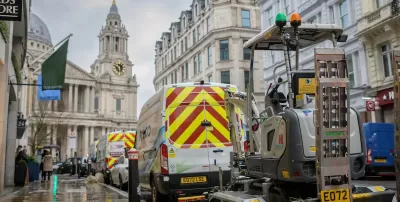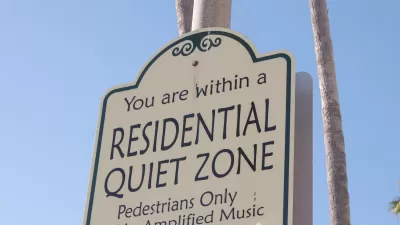London power workers are trialing zero-emission electric diggers that remove more than 200 tonnes of CO2 emissions and 75% of noise pollution from their work in the capital.

UK Power Networks and Falco Construction are trialing the Takeuchi TB20e fully electric mini-excavators across London for digging and excavation works. The impressive equipment boasts some futuristic credentials that remove emissions from CO2e, NOX and particulates (PM.25) into the local atmosphere.
On top of that, in comparison to regular excavators, the TB20e produces 75 less less noise pollution — or 13 fewer decibels.
As the city’s electricity network is mostly underground cables, excavators are essential in maintaining the electricity supply to the nearly nine million residents. The initial trial of two e-diggers has shown promising results and Falco hopes to swap their 120-strong fleet of diesel excavators with their electric counterparts.
Alan Seyfi, support services director at Falco Construction, said: “The Takeuchi model is the first electric mini-excavator we have seen that performs comparably with more traditionally-powered diggers. We estimate that replacing our current 120-strong fleet with TB20e’s would directly remove over 200 tonnes of CO2e emissions each year and be a major step forward on our road to Net Zero.”
Vanessa Brooks, who works at the Walthamstow branch of Palmerston Veterinary Group, experienced the e-digger's reduced noise level firsthand while treating residents’ pets. She said: “I wouldn't say the work that was done has been anything over and above what a nervous dog would normally experience going for a walk, so I don't see any problems.”
“I can't detect any fumes or anything like that. If it's quiet and less fumes, it's definitely better for everyone, particularly businesses where people are coming and going. You have a lot of elderly people passing through this area who may not be able to move very quickly, so they don't want to be exposed to fumes and dust and things like that. It's beneficial for the community for sure.”
Both UK Power Networks and Falco have ambitions for Net Zero, helping to create a cleaner, greener and quieter future for all. UK Power Networks is also making sure the network is ready for increasing numbers of low carbon technologies including electric vehicles (EVs) and heat pumps.
Katherine Jennings, continuous improvement manager at UK Power Networks, said: “We are incredibly proud of this trial and excited about the initial positive findings, as e-diggers ultimately could be a huge enabler in UK Power Networks and Falco achieving their joint Net Zero commitments. “We are passionate about partnering with our suppliers to drive continuous improvement in the sustainability sphere. This is critical, as meaningful change and a just transition can only come about through shared goals and joint initiatives.”
Positive feedback on the trial from the Greater London Authority has cemented the trial as a way forward for construction and utility works in the capital and beyond. Mete Coban, London’s deputy mayor for environment and energy said: “The Mayor is committed to reducing toxic air pollution and reaching his ambitious goal of net-zero carbon by 2030.”
“We know that construction vehicles such as diggers contribute significantly to air pollution, which is why the Mayor has tightened standards across London. It’s great to see companies like UK Power Networks and Falco Construction leading the way and rolling out electric diggers. Technology like this will help to ensure Londoners, particularly those who live in the most deprived parts of London, can breathe cleaner air while also supporting our work to build a safer, greener London for everyone.”
FULL STORY: UK Power Networks partners with Falco Construction in e-digger rollout

Trump Administration Could Effectively End Housing Voucher Program
Federal officials are eyeing major cuts to the Section 8 program that helps millions of low-income households pay rent.

Planetizen Federal Action Tracker
A weekly monitor of how Trump’s orders and actions are impacting planners and planning in America.

The 120 Year Old Tiny Home Villages That Sheltered San Francisco’s Earthquake Refugees
More than a century ago, San Francisco mobilized to house thousands of residents displaced by the 1906 earthquake. Could their strategy offer a model for the present?

HSR Reaches Key Settlement in Northern California City
The state’s high-speed rail authority reached an agreement with Millbrae, a key city on the train’s proposed route to San Francisco.

Washington State Legislature Passes Parking Reform Bill
A bill that would limit parking requirements for new developments is headed to the governor’s desk.

Missouri Law Would Ban Protections for Housing Voucher Users
A state law seeks to overturn source-of-income discrimination bans passed by several Missouri cities.
Urban Design for Planners 1: Software Tools
This six-course series explores essential urban design concepts using open source software and equips planners with the tools they need to participate fully in the urban design process.
Planning for Universal Design
Learn the tools for implementing Universal Design in planning regulations.
Ada County Highway District
Clanton & Associates, Inc.
Jessamine County Fiscal Court
Institute for Housing and Urban Development Studies (IHS)
City of Grandview
Harvard GSD Executive Education
Toledo-Lucas County Plan Commissions
Salt Lake City
NYU Wagner Graduate School of Public Service





























